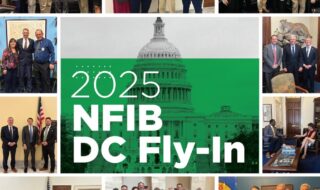Topics:
May 15, 2024 Last Edit: June 5, 2025
NFIB State Director Natalie Robinson writes that making it law could create a host of problems
Wage Transparency Could Have Unintended Consequences
NFIB State Director Natalie Robinson recently wrote a guest column for Indianapolis Business Journal about efforts to pass pay transparency legislation in the state legislature. She writes that revealing salary information might work in some circumstances but shouldn’t be law.
By NATALIE ROBINSON
Over the past few years, a number of cities and states have passed pay transparency laws. Specifics vary, but these laws require employers to give candidates and workers a better idea of how much other people are getting for doing more or less the same job.
That might seem reasonable, but, of course, the devil’s in the details.
Take the legislation just signed into law over in Illinois. Starting in 2025, businesses with 15 or more workers will be obliged to include salary ranges and a description of benefits in published job postings.
Many employers do that anyway, but my organization, the National Federation of Independent Business, argued against making it the actual law. Our small business members believe it could make it harder for them to recruit workers, cause internal conflict with existing employees who think they should be making more, and expose owners to costly fines and litigation.
The Illinois law gives employers 14 days on the first offense to correct an active job posting. The fine for a first offense is capped at $250 for an old posting and $500 for a current one. The penalties escalate quickly with a third offense resulting in a fine of $10,000. Small businesses operate on notoriously thin margins, and with inflation continuing to drive up the cost of running a small business, $10,000 could be the straw that breaks the camel’s back.
In Washington State, job seekers can get $5,000 thanks to its salary transparency laws requiring employers to post salary ranges and benefits in job listings. That 2023 law unleashed a flood of lawsuits against employers. Many of the plaintiffs include job applicants who applied for multiple jobs and sued multiple companies.
Indiana’s small businesses don’t believe the government should dictate what’s in their job postings. If a small business owner decides the best tactic is to post the salary range or benefits within the public listing, great. But that should be at the discretion of the employer, not a group of politicians.
Small business owners already are worried about their ability to find and keep quality employees. NFIB’s latest Small Business Economic Trends survey shows that finding qualified candidates is among the biggest challenges facing small-business owners right now.
While well-intentioned, pay transparency laws do little to address any perceived pay gap. Instead, they set employers, particularly small businesses, up for non-compliance subject to the motivations of the applicant. These mandates also demonstrate a lack of understanding regarding the nature of a small business’s labor and productivity needs – job responsibilities, titles, and specific roles are often nebulous and ever-evolving.
Compensation and wage ranges may not be uniform for any given available position but can fluctuate based on individual workers’ qualifications, experience, and availability. Mandates that fail to differentiate between large corporations and family-owned businesses usually hurt the latter, and that’s something Indiana’s small businesses can’t afford.
State:
Get to know NFIB
NFIB is a member-driven organization advocating on behalf of small and independent businesses nationwide.
Related Articles


July 3, 2025
NFIB Thanks Congress for Passing Landmark Small Business Tax Re…
NFIB applauds Congress for passing the One Big Beautiful Bill Act, which in…
Read More


July 2, 2025
NFIB Key Votes One Big Beautiful Bill Act in U.S. Senate and Ho…
NFIB key votes the One Big Beautiful Bill Act in the 119th Congress and urg…
Read More


July 2, 2025
Small Business Owners Push Priorities in Capitol Hill Meetings
Over 80 small business owners attended NFIB’s annual Fly-In. They attende…
Read More








